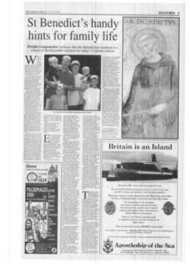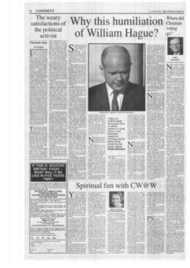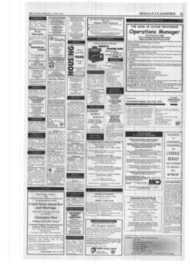Page 7, 15th June 2001
Page 7

Report an error
Noticed an error on this page?If you've noticed an error in this article please click here to report it.
Tags
Share
Related articles
Bishop In Storm Over 'gay Thanksgiving' Mass
Bishop Of Middlesbrough Retires 10 Years Early Because Of...
Cafod Chief's 20-year Reign Ends In Surprise Resignation
Crowley Accepts Diocese
Bishop Crowley Installed
Bishop Crowley: the need for caution
LAST SATURDAY, Bishop John Crowley of Middlesbrough withdrew at the last moment from officiating at a Mass to celebrate the 25year gay relationship of Julian Filochowski, director of Cafod, and Martin Pendergast, a leading gay militant actively engaged in the struggle against Catholic teaching on homosexuality.
Bishop Crowley, that is to say, was about to give his support in the most solemn and public manner possible — by celebrating the Eucharist — to what has been widely seen as an open defiance of the teaching of the Church.
Bishop Crowley now says he had no such intention. The bishop could not be contacted as we went to press (he was on a visit to Holland) but his spokesman was clear that he would not have attended the Mass if he had believed it was celebrating a homosexual partnership. He said: "Had he understood that they had a physical relationship, he would not have gone. He was very clear about that. He is not the least bit wobbly on the Church's teaching. He was very firm that at no time would he do anything to undermine it."
That, on the face of it, should be that: the bishop, on this account, might be open to criticism for being a little naive, perhaps; but he withdrew at the last minute from what would in any case have been no more than an understandable mistake rather than a grave misuse of his office, so serious that dismissal or resignation could now be the only proper outcome.
BUT THE MORE this strange affair unfolds, the more it becomes clear that this account is problematical, to say the very least, and that if we are to understand what needs now to be said and done to limit the damage already inflicted, we need to assess the evidence calmly and dispassionately. Strong feelings about this affair are already growing. That is not necessarily helpful, however understandable it may be.
It is important, for instance, that the work of Cafod should not suffer. Whatever Julian Filochowski has or has not done in his private life, his achievement in building up the work of Cafod entitles him to our gratitude; it would be a grave error for parishes or individuals to withdraw from supporting Cafod's vital work because of an event which was not sponsored by Cafod, from which, indeed, Bishop John Rawsthorne, episcopal chairman of Cafod, has disassociated the charity.
It also has to be said that the personal morality of individuals is not for other individuals to comment on unless it directly affects them. Julian Filochowski's personal conduct is a matter between himself and God, who alone can read the souls of men: that, certainly, is the most any decent newspaper should say on such matters.
But the public behaviour of a Catholic bishop is a matter for the whole Church. It would be good, therefore, to be able to accept Bishop Crowley's explanations of what he did and what he intended to do. They have, however, already aroused widespread and understandable scepticism.
It has to be said that Bishop Crowley's statement, made to the congregation before the Mass last Saturday, is less than wholly convincing. He began by insisting that "in the light of some highly misleading press reporting today", he wanted "to make it perfectly clear at the outset that what [was] being celebrated at this Mass [was] as the invitation card indicated 'twenty five years of friendship and commitment to justice'. It is simply that".
But, of course, it was not "simply that". And even if we take these words at their face value, we have to ask what "justice" means in such a context. For Julian Filochowski, we can assume that before all else, justice means what Cafod thinks it means: justice for the world's poor. For Martin Pendergast, justice means at the very least what the Catholic caucus of the Lesbian and Gay Christian Movement thinks it means: the undermining and eventual destruction of the Church's teaching on sexual ethics.
Despite all that, those who know Bishop Crowley are convinced that, in the words of his spokesman, he "is not the least bit wobbly on the Church's teaching" and that "at no time would he do anything to undermine it"). He was, it seems, as totally unaware of Mr Pendergast's militant activities as he was of the nature of his relationship with Mr Filochowski.
BISHOP CROWLEY will, nevertheless, now have to face the scepticism of those (and there are many) who harbour the suspicion that had the Press not blown the gaff on this private event — so private that Bishop Crowley did not even inform the local diocesan, in this case the Cardinal, of his intended involvement — Bishop Crowley would have proceeded to celebrate this Mass in affirmation of a longstanding gay relationship, knowing very well that that was what he was doing.
Even if (as we must, it seems, accept) this is an unjust inference to draw from these events, the least that must be said is that it was on Bishop Crowley's part a piece of spin unworthy of a Catholic bishop to blame the press for the whole debacle by describing Victoria Combe's accurate and well-based Daily Telegraph article as "highly misleading" and as a "misrepresentation" which had led to "changed circumstances" and "the certainty that [his involvement would] be interpreted in a wholly misleading way" if he had continued as celebrant.
If there has been any misunderstanding, the least Bishop Crowley should do is to accept the responsibility for causing it, rather than attempting to shift the blame on to others. He has fences to mend: he would do well to begin with an acknowledgement that the press cannot always be blamed for everything.
blog comments powered by Disqus













